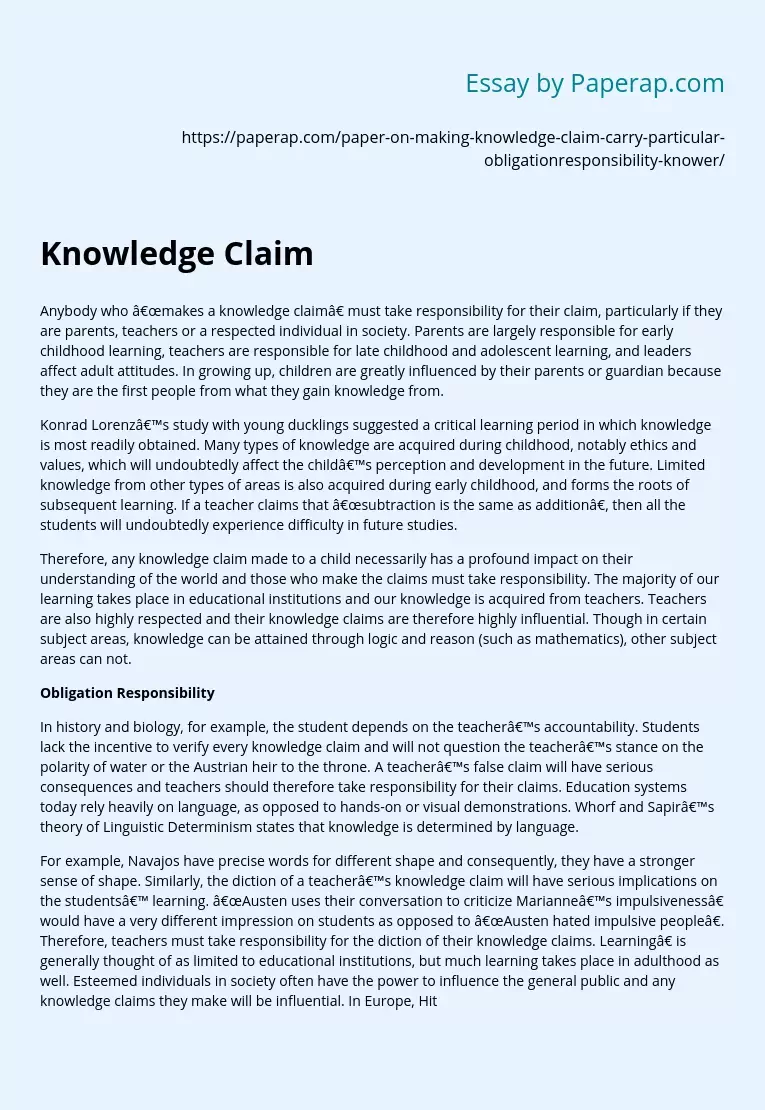Responsibility for Their Claims of Knowledge
The following sample essay is dedicated to the topic -Responsibility for Their Claims of Knowledge. Read the introduction, body and conclusion of the essay, scroll down.
Anybody who “makes a knowledge claim” must take responsibility for their claim, particularly if they are parents, teachers or a respected individual in society. Parents are largely responsible for early childhood learning, teachers are responsible for late childhood and adolescent learning, and leaders affect adult attitudes. In growing up, children are greatly influenced by their parents or guardian because they are the first people from what they gain knowledge from.
Konrad Lorenz’s study with young ducklings suggested a critical learning period in which knowledge is most readily obtained. Many types of knowledge are acquired during childhood, notably ethics and values, which will undoubtedly affect the child’s perception and development in the future. Limited knowledge from other types of areas is also acquired during early childhood, and forms the roots of subsequent learning. If a teacher claims that “subtraction is the same as addition”, then all the students will undoubtedly experience difficulty in future studies.
Therefore, any knowledge claim made to a child necessarily has a profound impact on their understanding of the world and those who make the claims must take responsibility. The majority of our learning takes place in educational institutions and our knowledge is acquired from teachers. Teachers are also highly respected and their knowledge claims are therefore highly influential. Though in certain subject areas, knowledge can be attained through logic and reason (such as mathematics), other subject areas can not.
Obligation Responsibility
In history and biology, for example, the student depends on the teacher’s accountability. Students lack the incentive to verify every knowledge claim and will not question the teacher’s stance on the polarity of water or the Austrian heir to the throne. A teacher’s false claim will have serious consequences and teachers should therefore take responsibility for their claims. Education systems today rely heavily on language, as opposed to hands-on or visual demonstrations. Whorf and Sapir’s theory of Linguistic Determinism states that knowledge is determined by language.
For example, Navajos have precise words for different shape and consequently, they have a stronger sense of shape. Similarly, the diction of a teacher’s knowledge claim will have serious implications on the students’ learning. “Austen uses their conversation to criticize Marianne’s impulsiveness” would have a very different impression on students as opposed to “Austen hated impulsive people”. Therefore, teachers must take responsibility for the diction of their knowledge claims. Learning” is generally thought of as limited to educational institutions, but much learning takes place in adulthood as well. Esteemed individuals in society often have the power to influence the general public and any knowledge claims they make will be influential. In Europe, Hitler’s numerous claims concerning Germany’s superiority aroused millions to support him. The destruction and causality that his knowledge claims directly or indirectly caused in World War II are horrendous and indisputable.
In China, Chairman Mao’s knowledge claims brainwashed millions of young Chinese to join the Red Army. Consequences of Mao’s knowledge claims during the Cultural Revolution are also apparent. Both Hitler and Mao were highly influential leaders who are responsible for their knowledge claims. Hence, leaders should take precaution in their knowledge claims and statements for they are responsible for their claims. Naturally, knowledge claims of leaders can be beneficial to vast populations, and leaders can treat their responsibility as an opportunity positively influence people rather than a burden.
The consequences and implications of knowledge claims are indisputable, and therefore the people whom make knowledge claims should take responsibility for them. Since learning takes place throughout our lives, the people who teach us in all stages should take responsibility for their knowledge claims. Though parents, teachers, and respected individuals are heavily liable for their claims, they are not the only ones who must take the burden. Every person we interact with will influence us, and therefore, all knowledge claims must be taken responsibility for by the knower.
Responsibility for Their Claims of Knowledge. (2019, Dec 05). Retrieved from https://paperap.com/paper-on-making-knowledge-claim-carry-particular-obligationresponsibility-knower/

